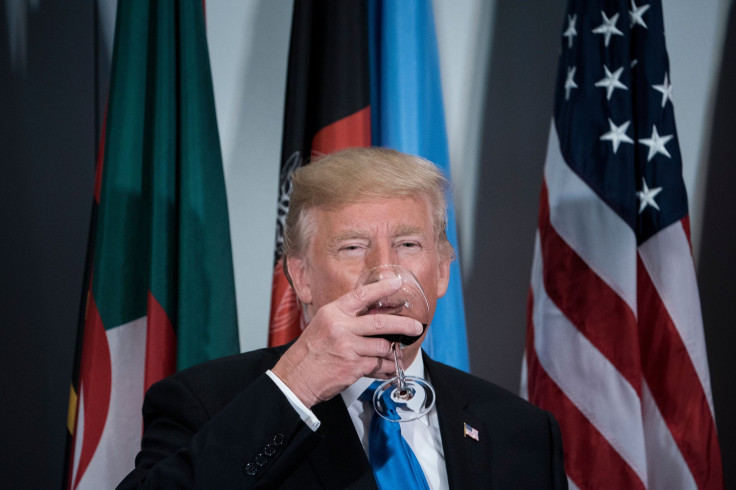Will Trump's New Travel Ban Secure Borders? Everything You Need To Know

In what is being viewed as an alternative to the executive order issued to ban the entry of people from six Muslim majority nations into the United States after President Donald Trump assumed office, POTUS imposed new travel restrictions on eight countries on Sunday. The latest set of restrictions will impact people traveling to the U.S. from Chad, Iran, Libya, North Korea, Somalia, Syria, Venezuela, and Yemen.
Trump’s earlier travel ban that evoked sharp reactions from all quarters for imposing restrictions on people from Iraq, Iran, Libya, Somalia, Sudan, Syria, and Yemen was set to expire Sunday. In a tweet referring to the latest order, where he has named three non-Muslim countries — North Korea, Venezuela, and Chad — he said the U.S. would not allow entry to the people it “cannot safely vet.”
Days after Trump lashed out at Pyongyang during his maiden address at the UN General Assembly (UNGA) over its nuclear ambitions, a statement issued Sunday by the White House Sunday read, "The entry into the United States of nationals of North Korea as immigrants and nonimmigrants is hereby suspended.”
On Saturday, the foreign minister of North Korea or Democratic People's Republic of Korea (DPRK), Ri Yong Ho, responded to Trump’s UNGA speech and said people in the U.S. called him "commander in grief", "lying king", and "president evil,” state-run KCNA reported.
Talking about the sanctions imposed by the UN earlier this month, he said, “If the 'resolutions' on the DPRK adopted at the Security Council are truly lawful and fair, there will be no need that all U.S. ambassadors abroad and even the president and the state secretary turn out to coerce other countries into implementing the 'resolutions.'" The UN adopted the resolution, drafted by the U.S. after Pyongyang tested a hydrogen bomb.
Iran, described as a “murderous regime” by Trump during his UNGA address, also faces new restrictions for failing to cooperate with the U.S. “in identifying security risks, fails to satisfy at least one key risk criterion,” as per the official statement. Only individuals with valid student and exchange visas would be allowed in the U.S. after the ban is implemented Oct. 18. Soon after the ban was announced, Iran’s Foreign Minister Javad Zarif took to Twitter and criticized POTUS.
Trump’s fake empathy for Iranians rings ever more hollow, with his new and even more offensive travel ban against such outstanding citizens.
— Javad Zarif (@JZarif) September 25, 2017
Earlier in June, Trump had said that states that sponsor terrorism fall victims to the evil they promote after the Iranian Parliament was targeted in a terror attack.
Calling the latest order “Muslim 3.0 ban,” the National Iranian American Council (NIAC) issued a statement and claimed the president was not concerned about safety of the people in the U.S. “This new Muslim Ban 3.0 is nothing but an extension of the same discriminatory policy first rolled out in January that is a fundamental challenge to American values of equality and tolerance. Once again, Trump has put his ego ahead of the security of the United States and the safety of the American people," the statement read.
A ban on the entry of Muslims and making American borders secure were among the many proposals put forth by Trump during the presidential campaign. He announced the Muslim travel ban first in January after he assumed office and then revised it in March as the executive order created widespread chaos. The latest restrictions, however, are well thought-out, the Associated Press reported citing officials from the Department of Homeland Security. The DHS officials reviewed the guidelines for three months and eventually shortlisted eight countries that did not comply with the new U.S. requirements that countries should share information about travelers' criminal history or terror activity.
Meanwhile, the White House in its statement also insisted that like Iran, Syria has also been designated as “state sponsor of terrorism,” by the Department of State and the U.S. would not allow the entry of Syrian citizens as immigrants or non-immigrants. However, as far as Venezuela is concerned, where socialism is to be blamed for the economic crisis, according to Trump, government officials will not be allowed in the U.S. as they are “responsible for identified inadequacies.”
Trump administration seems to have softened its stance on Sudan that has been removed from the list of countries facing the restrictions. The development came hours before it was revealed that a Sudanese immigrant, Emanuel Kidega Samson, was believed to be involved in a shooting attack in Tennessee.
However, criticizing the Trump administration for the latest set of restrictions, former President Barack Obama's Foreign Policy Advisor Ben Rhodes expressed doubt if the approach would really boost national security.
The inclusion of Venezuela and North Korea shows this was never about terrorism at all and is just politics. https://t.co/VRA4quCawK
— Ben Rhodes (@brhodes) September 25, 2017
The latest order has also invited criticism from civil rights group. The Council on American-Islamic Relations (CAIR) called the ban a part of an “ugly white supremacist agenda.”
“This ugly agenda is nothing new. This is a man who was sued for refusing to rent to African-Americans, who called for the death penalty for five African-American and Hispanic young people falsely accused of rape, who was once quoted as objecting to having African-Americans ‘counting my money,’ who retweeted racist and anti-Semitic material, who called for a ‘total and complete shutdown of Muslims entering the United States,’ who called Mexican immigrants ‘rapists,’ and who said a judge’s Mexican heritage made him unfit to preside over a case,” CAIR National Executive Director Nihad Awad said in a statement.
Amnesty International also condemned the latest restrictions saying: “Just because the original ban was especially outrageous does not mean we should stand for yet another version of government-sanctioned discrimination.”
© Copyright IBTimes 2024. All rights reserved.











